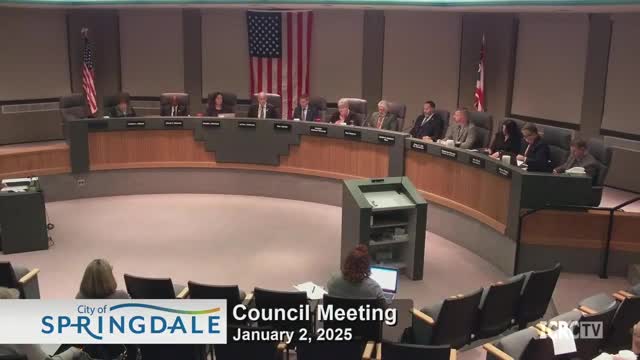Springdale council fails to adopt ordinance to permit backyard hens, rabbits and bees
Get AI-powered insights, summaries, and transcripts
Subscribe
Summary
After a public hearing and extended debate, the Springdale City Council voted 4-3 on Jan. 2 against Ordinance 55-2024 — a proposed update to the city code that would have allowed limited keeping of hens, rabbits and bees under a new permit system. The measure needed a supermajority and therefore failed.
Springdale City Council on Jan. 2 failed to adopt Ordinance 55-2024, a third-reading amendment to Section 153.252(f)(6)(c) of the Springdale Codified Ordinances that would have regulated the on-site husbandry of fowl, rabbits and bees. The vote was 4 in favor and 3 opposed; because the planning commission had recommended against the measure, a supermajority was required and the ordinance failed.
The ordinance, as read into the record, would have created a two-year, nontransferable certification for residents to keep certain animals and capped the program at 25 active certificates at any time. Under the language read aloud, the law would have permitted no more than six hens on single-family residential parcels of one-half acre or greater; chicken coops would have been limited to 30 square feet and seven feet tall, located in rear yards at least 15 feet from property lines, screened from view, and kept in sanitary condition. The packet language read also said rabbits and bees could be raised on single-family residential properties greater than three acres and that structures housing rabbits and bees must be located in rear yards at least 100 feet from property lines. The city would have issued certifications after inspection and could revoke a certificate after two violations.
The ordinance text as read contained several transcription errors; the council packet and official ordinance should be consulted for the final, authoritative wording. The ordinance also included administrative direction that city staff create a permitting and certification process consistent with the ordinance and made the certification subject to renewal.
Residents had an opportunity to speak during a public hearing before the council voted. Denise Bollinger, a Springdale resident, told council she supported putting the full urban-farming package — including chickens, rabbits and bees — before voters rather than deciding it through council action. "I just think if it doesn't go through tonight, then maybe we should think about putting it on a ballot," Bollinger said.
Council debate centered on balancing property rights with neighborhood impacts and enforceability. Councilmember Jacobs, who supported the ordinance, described the long process and the compromise the committee reached: "At the end of the day, what we've done is we've relaxed one restriction and then added a whole bunch of restrictions that didn't exist before," Jacobs said, adding that the committee had sought to allow property use while protecting neighbors. Jacobs noted the permit cap and acreage limits meant relatively few households would be eligible; he said 134 residences would qualify and only 25 certificates would be available.
Councilmember Webster said she would vote against the measure, citing deference to existing law and enforcement concerns: "I can't really vote for this because I know they're your pets ... but I am kind of a law-and-order type person, so I will have to vote against it," Webster said. Councilmember Vanover said he opposed the ordinance in part because he thought bees would be more environmentally beneficial than including chickens now.
Councilmembers who voted yes were Jacobs, Gleaves, McFarland and Anderson; those who voted no were Webster, Sullivan and Vanover. Because the planning commission did not recommend the ordinance, the council required more than a simple majority to adopt the change; it therefore failed with four affirmative votes and three negatives. Council noted the same or substantially similar ordinance could not be taken up again for 90 days. Officials also said residents remain free to pursue a citizen initiative under the city charter and with guidance from the Board of Elections.
The city attorney and administration were referenced during the discussion regarding process and next steps, and the urban-farming committee was described by councilmembers as a phased effort that could return to consider bees and rabbits in more detail.
With the ordinance defeated, no regulatory change to the husbandry code occurred at this meeting.
